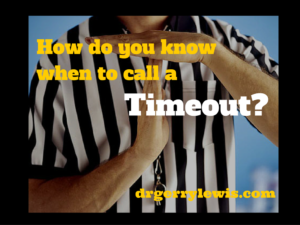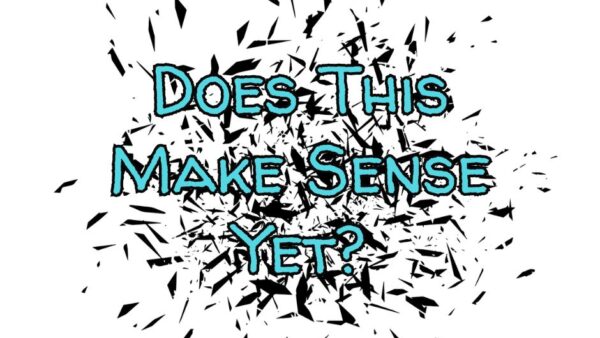
Timeout!
When I was growing up, that phrase only meant one thing: a brief pause in a sporting event of some kind. There was no such thing as a misbehaving child being put into “timeout.” At least not at our house. The only way that a timeout might be called in conjunction with misbehavior was if the person administering the swats got tired before the number of swats was completed. But that’s not the focus today.
Actually, with the beginning of football season, I thought I might write a series of posts on life lessons from the gridiron. Now, I will admit up front that I never played organized football. I played a lot of playground football, but my primary sport was tennis (Texas AAA State Doubles Champion, 1980). Ever since my knees left me about 15 years ago, my sports playing days are over, but I do enjoy watching. And this time of year, that means football. And one of the most strategic parts of the game is the proper use of the timeout.
Here’s what I know about timeouts and how the concept translates into life off the field:
- A time out can be used when you are confused, out of position, or just plain exhausted. Sometimes in life, you just have to take a break to regroup and rethink. Sometimes, what you need most is to recharge. A timeout can keep you from making a bad decision because you don’t have a clear perspective. A timeout can allow you to take a good look at your resources and put the right ones in place for the specific task at hand. How many bad outcomes could we all have avoided by the strategic use of a timeout?
How many bad outcomes could we all have avoided by the strategic use of a timeout? Click To Tweet
- A time out can be used to shift momentum or create a new mindset. We’ve seen coaches attempt to “ice” the other team’s kicker by calling a timeout just before the ball is snapped for a field goal attempt. The idea is to break the kicker’s concentration and cause him to overthink his second kick. Sometimes the timeout is simply called because the other team has all the momentum on their side. I don’t always think about the “opposing team” in real life, but I often think about how momentum may be going in the wrong direction. I am in defensive mode rather than offensive, reacting to what is happening to me rather than proactively choosing my actions. Sometimes a timeout is the only way to shift our mindset.
- Nobody gets unlimited timeouts, so they have to be used wisely. The absolute worst use of a timeout is fear of failure. We know what play to run. We have everyone on the field. We are all in position. We have no guarantee of success, but we have put ourselves in the best position we can. And then we start second-guessing ourselves. We wonder if we’ll get sacked. We wonder if the “fans” will boo us. And so we call a timeout because we are simply afraid to snap the ball. Here’s an important truth: timeouts never put points on the scoreboard. A timeout is only strategic when it results in execution on the field.
A timeout is only strategic when it results in execution on the field. Click To Tweet
Our lives matter so much to our Coach, that He invites us to come over to the sideline at strategic moments. He says, “Come to Me, all who are weary and heavy-laden, and I will give you rest. Take My yoke upon you and learn from Me, for I am gentle and humble in heart, and you will find rest for your souls. For My yoke is easy and My burden is light.” (Matthew 11:28-30)
What kind of timeout could you use today?



